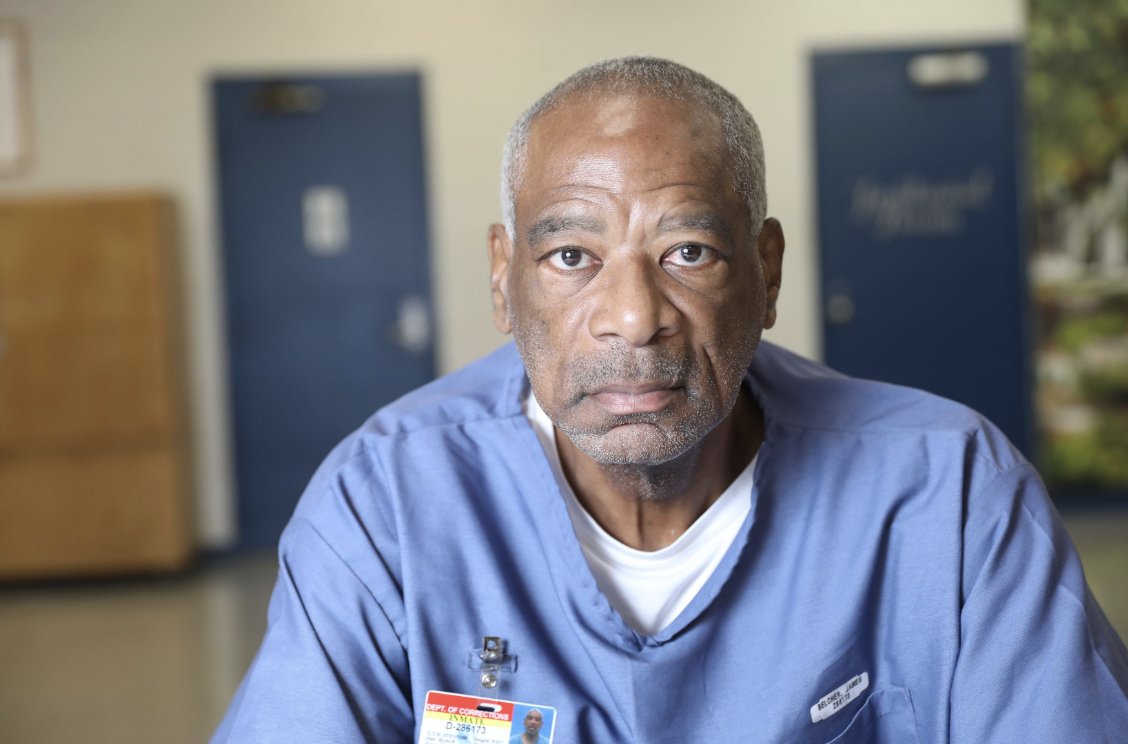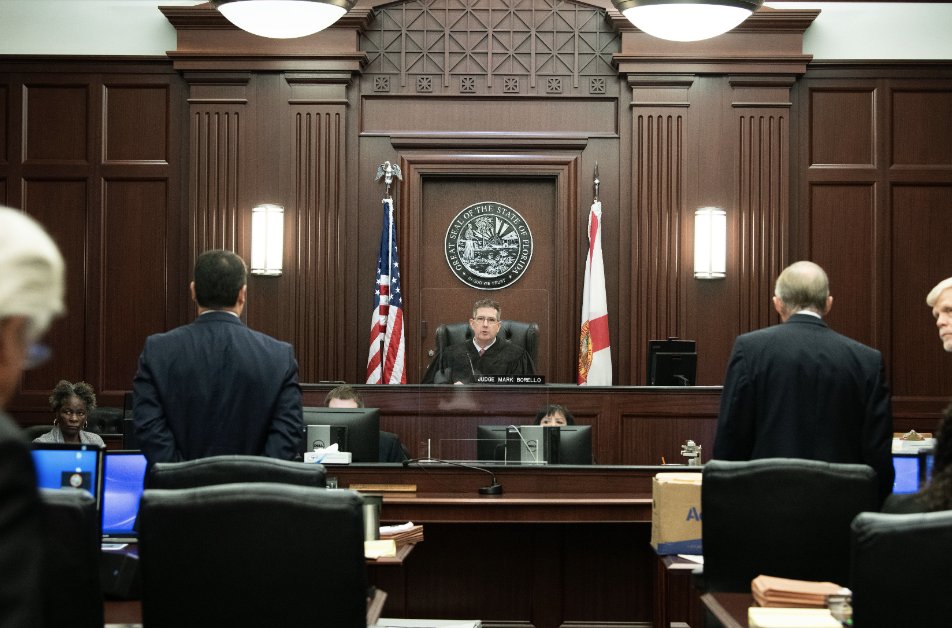
While reporting this story, I watched a Black man face the death penalty.
His jury had *zero* Black members. One Latinx member. Nearly all-White.
How? I watched ~20 hours of jury selection that led to this outcome. Here’s a thread.
themarshallproject.org/2023/03/02/dea…
His jury had *zero* Black members. One Latinx member. Nearly all-White.
How? I watched ~20 hours of jury selection that led to this outcome. Here’s a thread.
themarshallproject.org/2023/03/02/dea…
Some prosecutors strike Black people from the jury pool and claim there’s a reason beyond race.
Sometimes, it’s coded: You're kicked off the jury, for example, because you agreed with the OJ Simpson verdict.
But there's more to it.
themarshallproject.org/2015/11/02/can…
Sometimes, it’s coded: You're kicked off the jury, for example, because you agreed with the OJ Simpson verdict.
But there's more to it.
themarshallproject.org/2015/11/02/can…
Even before the prosecutors + defenders choose people to cut from the jury pool, there’s a process called “death qualification.” (That’s really the name.)
If you're going to serve on a death penalty jury, you must agree you *could* give it.
SCOTUS has said: Sure, makes sense.

If you're going to serve on a death penalty jury, you must agree you *could* give it.
SCOTUS has said: Sure, makes sense.


53% of Non-White Americans oppose the death penalty vs. 38% of White Americans (@Gallup/2021)
So if you cut everyone who opposes the punishment from the jury, you’re less likely to get Black jurors — and more likely to have an all-White jury.
news.gallup.com/poll/357440/de…
So if you cut everyone who opposes the punishment from the jury, you’re less likely to get Black jurors — and more likely to have an all-White jury.
news.gallup.com/poll/357440/de…
In Jacksonville last fall, James Belcher faced the death penalty for killing Jennifer Embry. Both Black.
I counted 15-20 potential Black + Latinx jurors in a pool of 79. (Almost 1 in 4)
(Can’t be exact since nobody self-identifies. Prosecution/defense are perceiving/guessing.)

I counted 15-20 potential Black + Latinx jurors in a pool of 79. (Almost 1 in 4)
(Can’t be exact since nobody self-identifies. Prosecution/defense are perceiving/guessing.)


The potential jurors had to declare — in front of strangers — if they could sentence someone to execution.
Many cried. A young Black man said, “I don’t have the life experience to make such a decision."
More on juror trauma:
themarshallproject.org/2016/03/10/my-…
Many cried. A young Black man said, “I don’t have the life experience to make such a decision."
More on juror trauma:
themarshallproject.org/2016/03/10/my-…
At the trial I saw, a potential juror was a DoorDash driver. Getting picked was going to cost him a week of income.
So he was more likely to get out of it, robbing the jury of economic diversity.
There’s talk of raising juror pay in some states:
cbsnews.com/losangeles/new…
So he was more likely to get out of it, robbing the jury of economic diversity.
There’s talk of raising juror pay in some states:
cbsnews.com/losangeles/new…
I counted 10 Black people cut from the jury pool — more than half — because they couldn’t give the death penalty.
“I believe in life,” said one. “I saved a larvae the other day.”
“I couldn’t sleep last night,” said another. “I don’t know if I could have it on my conscience.”
“I believe in life,” said one. “I saved a larvae the other day.”
“I couldn’t sleep last night,” said another. “I don’t know if I could have it on my conscience.”

Plenty of White people said they opposed the death penalty too and couldn’t serve – one said executions make Florida itself a “murderer” – and 3 Latinx people said that, too.
1 Latina woman made the jury. She ended up the foreperson.
1 Latina woman made the jury. She ended up the foreperson.
I counted the defense used 2 peremptory strikes on potential Black jurors.
The prosecution used 3.
Then 2 more were cut for unrelated reasons (like knowing a witness personally).
The prosecution used 3.
Then 2 more were cut for unrelated reasons (like knowing a witness personally).
You can also be cut from a jury if you say you’re biased because you feel the criminal justice system treated you or a family member unfairly.
That may also lead to fewer Black jurors.
One older Black man said he was falsely accused of shoplifting shoes and handcuffed.
That may also lead to fewer Black jurors.
One older Black man said he was falsely accused of shoplifting shoes and handcuffed.
Prosecutors tend to say: Without “death qualification,” you would never get the death penalty.
Defense lawyers say: You’re only getting the death penalty by robbing Black defendants of juries of their peers.
aclu.org/news/capital-p…
Defense lawyers say: You’re only getting the death penalty by robbing Black defendants of juries of their peers.
aclu.org/news/capital-p…
According to this study, Black jurors were twice as likely to be removed as White jurors in death penalty cases, in Duval County, Florida:
aclu.org/sites/default/…
aclu.org/sites/default/…
Scholars also have found that “death-qualified” juries are more likely to convict, even in the face of evidence that the defendant is innocent.
Here’s @RadleyBalko on the Curtis Flowers case and why jury diversity matters:
washingtonpost.com/opinions/2019/…
Here’s @RadleyBalko on the Curtis Flowers case and why jury diversity matters:
washingtonpost.com/opinions/2019/…
You could blame the prosecutors for striking Black citizens or the defense for doing the same and not challenging the makeup.
But “death qualification" accounted for most of the Black jurors being cut, and went beyond the idiosyncrasies of what any one juror said.
But “death qualification" accounted for most of the Black jurors being cut, and went beyond the idiosyncrasies of what any one juror said.
The defendant was a Black man.
The victim was a Black woman.
The final jury was 8 White women, 1 Latina woman, and 3 White men. 0 Black jurors.
To see more about the case, read my latest @MarshallProj story: themarshallproject.org/2023/03/02/dea…
The victim was a Black woman.
The final jury was 8 White women, 1 Latina woman, and 3 White men. 0 Black jurors.
To see more about the case, read my latest @MarshallProj story: themarshallproject.org/2023/03/02/dea…
• • •
Missing some Tweet in this thread? You can try to
force a refresh










